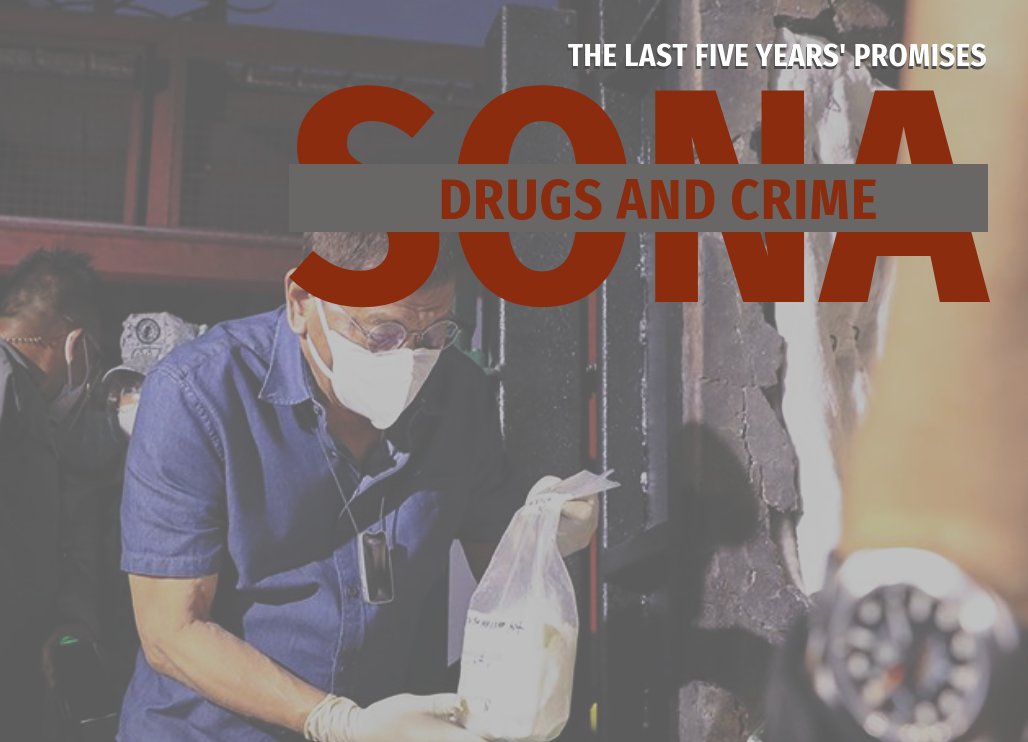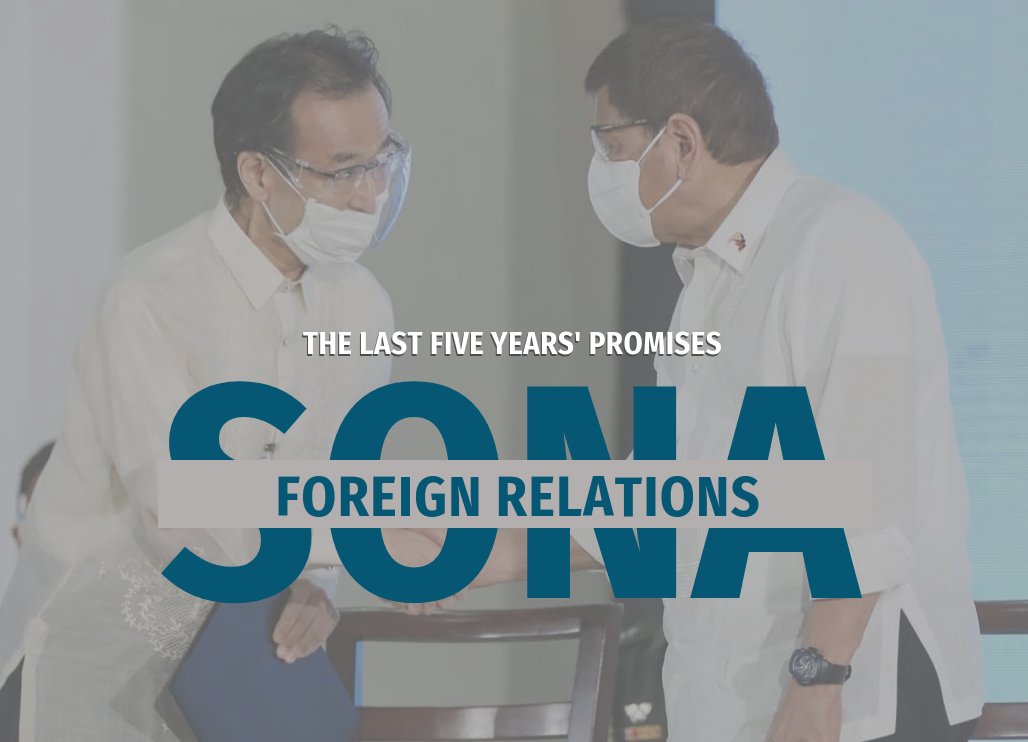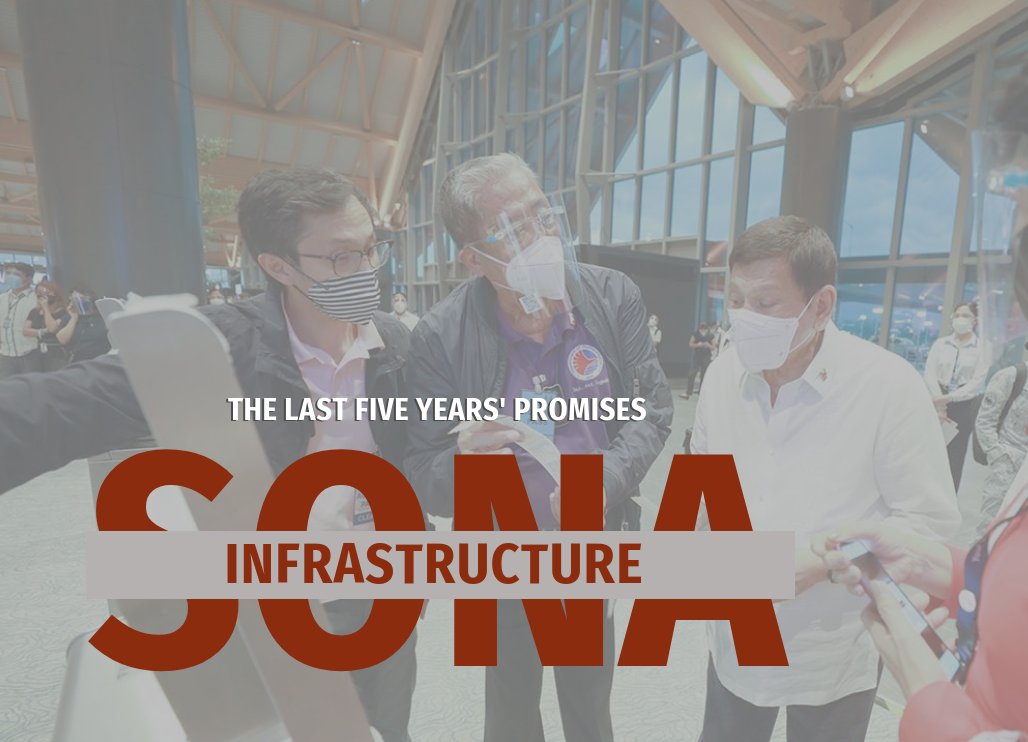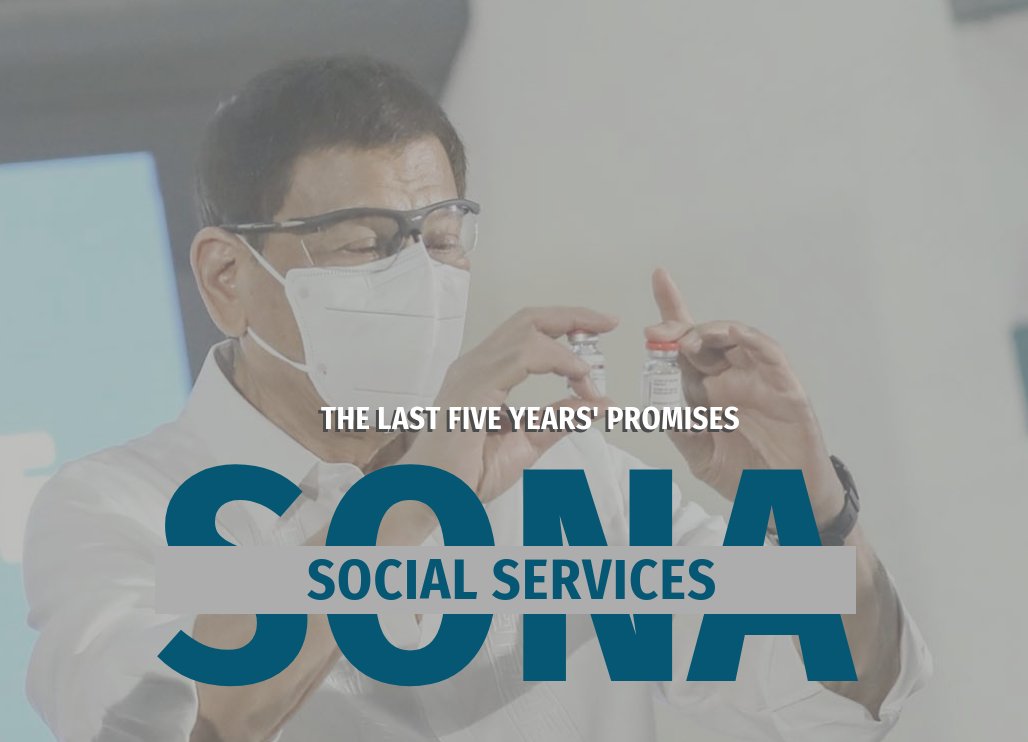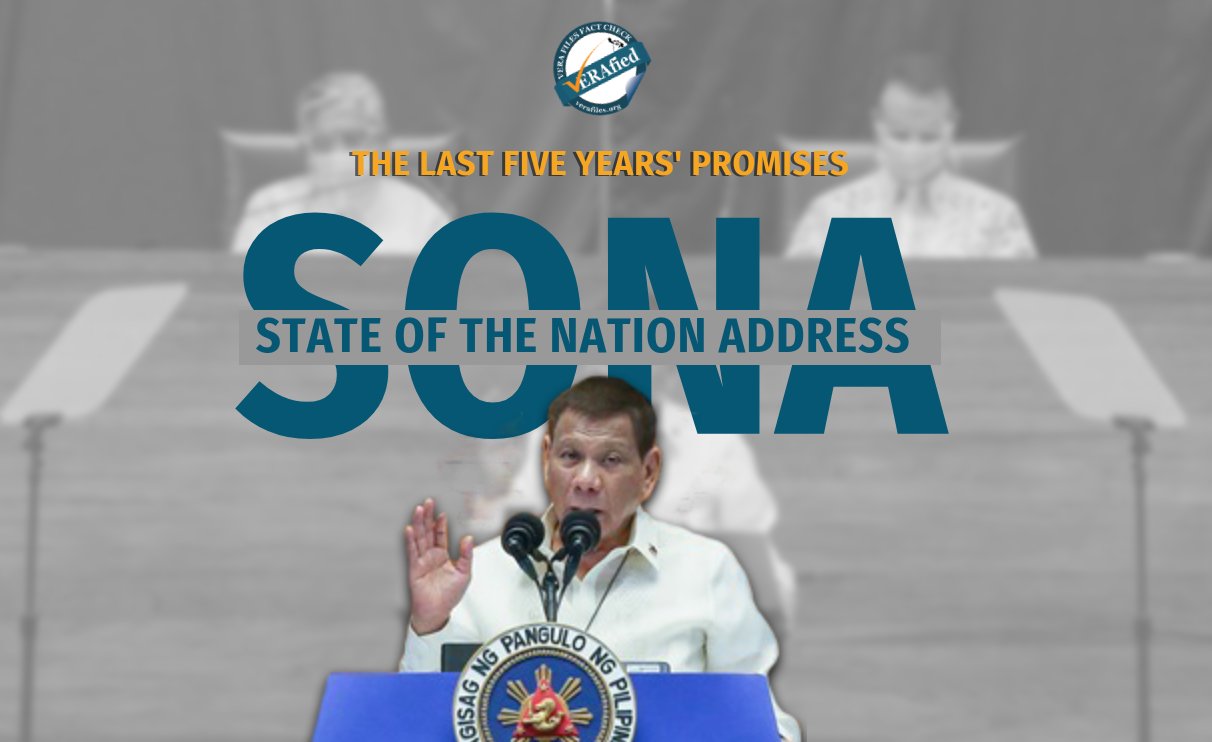President Rodrigo Duterte’s self-imposed deadline to eradicate illegal drugs and reduce criminality “within three to six months” has long passed, and Congress has yet to respond to his constant plea for the revival of the death penalty against drug-related crimes.
The restoration of the capital punishment, Duterte said in his 2020 State of the Nation Address (SONA), “will not only help us deter criminality but also save our children from the dangers posed by illegal and dangerous drugs.”
As he entered his fifth year into the presidency in July last year, he said “the dealers and purveyors of illegal drugs, hiding in the shadow of COVID-19, have stepped up their activities.” He noted that “the amount of shabu valued at millions of pesos seized during police operations speak volumes of the enormity and weight of the problem that we bear.”
Since the campaign for the 2016 presidential elections up until recently, Duterte has been reiterating that his drive against illegal drugs will be “relentless.” In his 2018 SONA, he said it would also be “chilling.”
“My administration always believed that freedom from illegal drugs, terrorism, corruption and criminality, is itself a [human right],” he said in his 2020 SONA.
He said he has been “so vicious” in his fight against illegal drugs because the menace destroys Filipino families. Addressing those engaged in the drug trade, Duterte declared: “Do not do it in my country because I will really kill you. That is a commitment.”
The drug problem, he added, concomitantly increases other crimes. “But let me assure you, for as long as I am President, there can never be a runaway crime in any of our cities. Hindi ako papayag ng ganun (I will not allow that). I can assure you we will remain peaceful — relatively peaceful. Hindi naman (But not) very peaceful.”
In his 2016 SONA, Duterte vowed: “We will not stop until the last drug lord, the last financier, and the last pusher have surrendered or put behind bars or below the ground, if they so wish.”
Government data shows that as of the end of May 2021, police and security forces have killed at least 6,147 suspected drug dealers during operations. Human rights groups, however, estimate that the actual number has reached up to three times more.
Duterte is facing the possibility of being investigated by the International Criminal Court (ICC) for crimes against humanity over the alleged extrajudicial killings associated with his administration’s war on drugs. (Read Gov’t officials, police conspired to carry out Duterte’s war on drugs — ICC prosecutor)
However, he has refused to recognize the ICC’s jurisdiction over the Philippines following his withdrawal of the country’s membership to the Rome Statute. He said he would not cooperate with the ICC if it decides to launch a formal probe into his drug war, even after the Supreme Court said in a unanimous decision released on July 21 that it is the Philippines’ obligation to do so.
VERA Files tracked Duterte’s promises on drugs and criminality in his previous SONAs: five in 2020, which were mostly reiterations from his previous addresses, and four others from 2016 and 2018. See how Duterte fared in his promises on these:
PROMISE: Restore capital punishment for drug-related crimes |
|
“I reiterate the swift passage of a law reviving the death penalty by lethal injection for crimes specified under the Comprehensive Dangerous [Drugs] Act of 2002.” (SONA 2020) “I respectfully request Congress to reinstate the death penalty for heinous crimes related to drugs, as well as plunder.” (SONA 2019) “I therefore ask Congress to act on all pending legislations to re-impose the death penalty on heinous crimes — especially on the trafficking of illegal drugs.” (SONA 2017) |
|
On March 2, 2021, the House of Representatives approved on third and final reading House Bill (HB) No. 7814 which, under Section 2, provides a penalty of imprisonment to death and fine of P500,000 to P10 million for the export or import of dangerous drugs, regardless of quantity and purity of the substance. The bill’s repealing clause, however, stated that its provisions “shall not in any way repeal Republic Act No. 9346, or an Act Prohibiting the Imposition of Death Penalty in the Philippines.” Commissioner Karen Gomez-Dumpit of the Commission on Human Rights, in a statement opposing the bill, said: “We reiterate that the death penalty is not an effective deterrent and if passed, this is considered a serious breach of our international obligations, particularly under the International Covenant on Civil and Political Rights and its Second Optional Protocol aiming at the abolition of the death penalty.” Separately, the House committee on justice conducted a public hearing on Aug. 5, 2020 on at least 12 bills specifically seeking the re-imposition of the death penalty for heinous crimes. Muntinlupa City Rep. Ruffy Biazon, author of HB 741, requested that his bill be excluded from the agenda, citing the “timing” of the discussion “at the height of the COVID-19 pandemic.” Surigao del Norte Rep. Robert Ace Barbers, author of HB 2026, argued that the country’s judicial system has enough “safeguards” to protect a person from an unfair trial. But Cagayan de Oro City Rep. Rufus Rodriguez enumerated several repercussions that the country may face if the death penalty is reinstated: effects on trade agreements, serious breach of international commitments, and the possibility of the Philippines being regarded as a “rogue state” by the international community. For his part, Justice Assistant Secretary Nicholas Felix Ty said the Department of Justice (DOJ) does not see any legal or constitutional impediments in imposing the death penalty. At the same time, he said the modes of execution such as hanging, firing squad, or any manner for public viewing would be “tantamount” to “degrading” and inhumane punishment, therefore “unacceptable.” In the Senate, 12 bills pending in the committee on justice and human rights are up for sponsorship, according to Senate President Vicente “Tito” Sotto III. The death penalty was abolished in 2006 by Republic Act No. 9346, signed into law by then president Gloria Macapagal-Arroyo. |
PROMISE: The fight against illegal drugs will be relentless and chilling |
|
“The illegal drug problem persists … I am aware that we still have a long way to go in our fight against this social menace. (That’s) the reason why I advocate the imposition of the death penalty for crimes related to illegal drugs.” (SONA 2019) “The war against illegal drugs is far from over. Where before, the war resulted in the seizure of illegal drugs worth millions of pesos, today, they run [into] billions in peso value … This is why the illegal drugs war will not be sidelined. Instead, it will be as relentless and chilling, if you will, as on the day it began.” (SONA 2018) “I do not intend to loosen the leash in the campaign or lose the fight against illegal drugs. Neither do I intend to preside over the destruction of the Filipino youth by being timid and tentative in my decisions and actions.”(SONA 2017) “During my inauguration last June 30, 2016, I said that the fight against criminality and illegal drugs and corruption will be relentless and sustained. I reiterate that commitment today, and that is why I call on the Philippine National Police, the barangay chairmen, the mayors, the governors and all those occupying seats of power and authority, not to lower their guard. There will be no let-up in this campaign. Double your efforts. Triple them, if need be.” (SONA 2016) |
|
The approval of HB 7814 on third and final reading last March 2 became controversial because of the provisions for legal presumption on who is considered an importer, financier, or protector of illegal drugs: Suspects would be presumed guilty upon apprehension. Two days after the bill’s approval in the House, Sen. Panfilo Lacson said it was “highly improbable” that any senator would concur with the measure that proposes a presumption of guilt on drug trafficking suspects which, he said, is unconstitutional. Commissioner Gomez-Dumpit said the presumption of guilt in the bill “goes against this right guaranteed for the accused under the Bill of Rights of our 1987 Philippine Constitution.” Meantime, based on the Philippine Drug Enforcement Agency’s (PDEA) Real Numbers PH data, the administration’s war on drugs has resulted in the deaths of 6,147 persons from July 1, 2016 to May 31, 2021 and arrest of 293,841 others in more than 203,000 anti-drug operations nationwide. Out of the 42,045 drug-affected barangays across the country, 13,210 or 31.24% have yet to be cleared, according to PDEA. In an analysis by the Third World Studies Center, 186 killings during police operations were reported in the first quarter of 2021. Asked about the “biggest drug lord” caught in the anti-drug operations, Police Chief Gen. Guillermo Eleazar mentioned some “not popular” Chinese nationals and local government officials who were included in 12,356 arrested “high value targets.” “Pyramid kasi ‘yan, so ‘di ba sa atin ang talagang territorial police units in our campaign against illegal drugs, ang talagang nakikita at nae-engage natin diyan ay itong mga street pusher … at ‘yung nasa taas, most of them, hindi humahawak ng droga ‘yan. Puro tayo intelligence information, and in criminal justice, hindi mo puwedeng kasuhan ‘yan,” Eleazar explained in an interview on Headstart, ANC on July 20. Interior Secretary Eduardo Año said that Peter Lim, a fugitive and an accused drug lord, may have already fled the country. |
PROMISE: Enforce data protection and privacy laws on cyberspace |
|
“We must patrol the country‘s cyberspace and enforce online consumer and data protection and privacy laws. We must run after online scammers and those undermining the people‘s trust in online transactions. We must continue to protect Filipinos in the new normal and remind the world that we are responsible stewards of data.” (SONA 2020) |
|
The Philippine National Police – Anti- Cybercrime Group (PNP-ACG) launched an online portal called Enhanced Anti-Cybercrime Campaign, Education, Safety and Security (E-ACCESS) on July 8, where citizens can check records such as phone numbers and email addresses and tools used in online fraud. “Itong database natin ay sa ACG lang ito. Hindi po kasama rito ‘yung ibang [PNP] agencies. Now we are connecting all the databases ng iba’t ibang units nationwide sa ACG, e … eventually kung ang police unit i-refer sa atin ‘yan, at least mapapadami natin ang basis for information,” Police Chief Gen. Guillermo Eleazar explained. The Senate committee on trade, commerce and entrepreneurship has passed a bill penalizing hoax ordering which affects delivery riders of unjust order cancellations or bogus transactions. Seven bills seeking to require registration of SIM cards to individuals to minimize crimes relating to use of cellular phones are pending in the Senate. While Committee Report 131, substituting 15 bills is also pending in the House of Representatives. From the start of the pandemic, the Department of Information and Communications Technology has been warning Filipinos about links, websites, and applications that can compromise user’s devices and personal data. |
PROMISE: Go after profiteers, over-pricers, and corrupt felons
|
|
“The profiteers, over-pricers and corrupt felons must be laughing while they stash their dirty monies. But not for long. They cannot outrun the long arm of the law.” (SONA 2020) |
|
Last February, President Duterte approved the creation of a task group to go after smugglers, profiteers and hoarders of agricultural products. The Department of Trade and Industry (DTI) and Department of Agriculture (DA) were tasked to lead the multi-agency task force on economic intelligence. Also in February, Justice Secretary Menardo Guevarra directed the National Bureau of Investigation (NBI) to investigate groups or individuals engaged in profiteering and hoarding of agricultural products, including pork. He issued Department Order No. 029 dated Feb. 8, tasking the NBI through Officer in Charge Eric B. Distor to “conduct an investigation and case build-up” on alleged violations of Republic Act 7581 or the Price Act. The president has enacted the Bayanihan to Heal as One Act which provides, among others, measures to protect people from “hoarding, profiteering, injurious speculation, manipulation of prices, product descriptions, and cartels, monopolies, or other combinations in restraint of trade.” The law penalizes those acts with two months imprisonment or fine of P10,000 to P100,000, or both. |
PROMISE: Modernize the Bureau of Immigration |
|
“We must also modernize … the Bureau of Immigration (BI) with urgency.” (SONA 2020) |
|
Nine bills which are substituted with HB 8850 and two similar bills are pending in the House and Senate, respectively, seeking to modernize, professionalize, and improve the compensation of officials and personnel of the Bureau of Immigration (BI). The House began its first hearing of HB 8850, with Rep. Rodriguez sponsoring the measure on May 17. The Senate has yet to take up its counterpart measures. While the bills seeking to amend the 81-year-old law have yet to pass through Congress, Immigration Commissioner Jaime Morente said he had a “three-tier approach” to solve corruption in the bureau: relieve those implicated in the so-called pastillas scam; implement a one-strike policy for anyone who tries to follow suit; and reorganize the BI system to “add layers of checks and balances.” The BI modernization bills became more relevant following the expose of Sen. Risa Hontiveros regarding a multi-billion-peso bribery scheme called pastillas, referring to money bills wrapped in a bond paper and rolled like a milk candy and given to BI officials to allow “seamless entry” of foreigners in the country. Some 80 Immigration officials were charged with criminal and administrative suits in November 2020 for their alleged involvement in the so-called pastillas scheme. |
PROMISE: Maintain ‘relatively peaceful’ state in all cities |
|
“But let me assure you, for as long as I am President, there can never be a runaway crime in any of our cities. Hindi ako papayag ng ganun. I can assure you we will remain peaceful — relatively peaceful. Hindi naman (But not) very peaceful.” (SONA 2020) |
|
“If we compare the number of index crimes in the first five years of this administration to the last or even the first five years of the previous administration, it declined by 63% nationwide,” according to Police Chief Gen. Guillermo Eleazar. Eleazar disputed the Global Finance Safety Index that placed the Philippines at the bottom of the list of the safest countries across the globe. The Philippines got a score of 14.8899 in the Global Finance ranking, putting it at the bottom of 134 countries included in the list. Iceland was listed as the safest country with a score of 3.9724. |
PROMISE: Address the prosecution backlog, especially in illegal drug cases |
|
To address backlogs and low prosecutorial effectiveness and efficiency, the investigation and case management processes shall be streamlined including those for illegal drugs and heinous crimes. |
|
According to the Supreme Court 2019 annual report, regional trial courts have accumulated 114,544 drug-related cases, with a disposition rate of 54% compared with last annual report’s 34%. Only one measure remains pending in the Senate, and one of the four pending bills aiming to create additional five courts, including one drug court, have been substituted by HB 9567. |
PROMISE: Strengthening the protection for witnesses and whistleblowers |
|
“To eradicate the prevalent cultures of fear and silence that have hounded our justice system, I asked Congress to enact the Whistleblower Protection Law while the present Witness Protection Program shall be strengthened.” (SONA 2016) |
|
Five bills in the House and 25 others in the Senate are still pending in the committees. |
PROMISE: Revival of mandatory ROTC |
|
“We expect support for legislative initiatives aimed at strengthening defense-related systems such as the proposed…revival of the mandatory ROTC in Grades 11 and 12.” (SONA 2019) “Let us also strengthen our ROTC Program to instill love of country and good citizenship.” (SONA 2016) |
|
At least 23 bills in the House of Representatives and seven related measures in the Senate are pending at the committee level since those were filed in 2019. |
Sources
Presidential Communications Operations Office, 5th State of the Nation Address of Rodrigo Roa Duterte, July 27, 2020
Presidential Communications Operations Office, State of the Nation Address of Rodrigo Roa Duterte, July 23, 2018
RTVMalacañang YouTube, President Rodrigo Duterte’s 5th State of the Nation Address (SONA), July 27, 2020
Presidential Communications Operations Office, State of the Nation Address of Rodrigo Roa Duterte, July 25, 2016
Real Numbers Official Facebook, Persons who died during Anti-Drug Operations: 6,147, July 8, 2021
Presidential Communications Operations Office, Press Briefing of Presidential Spokesperson Harry Roque, July 22, 2021
Supreme Court of the Philippines, G.R. No. 238875/G.R. No. 239483/G.R. No. 240954. (March 16, 2021), July 21, 2021
On restoring capital punishment for drug-related crimes
- House of Representatives, HB No. 7814: An act strengthening drug prevention and control, amending Act No. 9165 “Comprehensive Dangerous Act of 2002”, Oct. 1, 2020
- Commission on Human Rights, Statement of Commissioner Karen Gomez-Dumpit on the Passage of House Bill No. 7814, providing for the ‘Presumption of Guilt’ and Reintroduction of the Death Penalty as amendments to the Comprehensive Dangerous Drugs Act of 2002, March 3, 2021
- House of Representatives Facebook, Committee on Justice: AGENDA: Regular Meeting of the Committee on Justice on the Bills Imposing the Death Penalty for Heinous Crimes Chairperson: Hon. Vicente “Ching” S.E. Veloso III – 3rd District, Leyte, Part 1, Aug. 4, 2020
- House of Representatives Facebook, Committee on Justice: AGENDA: Regular Meeting of the Committee on Justice on the Bills Imposing the Death Penalty for Heinous Crimes Chairperson: Hon. Vicente “Ching” S.E. Veloso III – 3rd District, Leyte, Part 2, Aug. 4, 2020
- House of Representatives, HB No. 741: Bill seeking to restore the death penalty for heinous crimes covered under RA 9165 or Comprehensive Dangerous Acts of 2002, July 1, 2019
- House of Representatives, HB No. 2026: An Reimposing the death penalty on certain heinous crimes, repealing RA 9346, July 11, 2019, July 11, 2019
- Senate of the Philippines, SB 1234: Reimposition of Death Penalty Act of 2019, Dec. 12, 2019
- Senate of the Philippines, SB 1091: Recognizing Hazing as a Heinous Crime, Oct. 1, 2019
- Senate of the Philippines, SB 796: Death Penalty Law of 2019, July 25, 2019
- Senate of the Philippines, SB 753: Reimposing the Death Penalty, July 24, 2019
- Senate of the Philippines, SB 495: Death Penalty Act, July 15, 2019
- Senate of the Philippines, SB 382: Death Penalty of the Heinous Crime of Rape with Homicide, July 11, 2019
- Senate of the Philippines, SB 381: Death Penalty on the Heinous Crime of Kidnapping, July 11, 2019
- Senate of the Philippines, SB 226: Death Penalty Law, July 4, 2019
- Senate of the Philippines, SB 207: Reinstating the Death Penalty for Certain Heinous Crimes, July 2, 2019
- Senate of the Philippines, SB 189: Imposing Death Penalty on Certain Heinous Crimes, July 2, 2019
- Senate of the Philippines, SB 187: Qualified Reclusion Perpetua Act, July 2, 2019
- Senate of the Philippines, SB 27: Death Penalty Act of 2019, July 1, 2019
- Senate of the Philippines, Press Release: Transcript of Senate President Vicente C. Sotto’s interview at the Kapihan sa Manila Bay with Marichu Villanueva, Jan. 13, 2021
- Official Gazette of the Philippines, RA 9346: Act prohibiting the imposition of death penalty, June 24, 2006
On drug war being relentless and chilling
- House of Representatives, HB No. 7814: An act strengthening drug prevention and control, amending Act No. 9165 “Comprehensive Dangerous Act of 2002”, Oct. 1, 2020
- Inquirer.net, Senate unlikely to back controversial anti-drug bill, March 6, 2021
- Commission on Human Rights, Statement of Commissioner Karen Gomez-Dumpit on the Passage of House Bill No. 7814, providing for the ‘Presumption of Guilt’ and Reintroduction of the Death Penalty as amendments to the Comprehensive Dangerous Drugs Act of 2002, March 3, 2021
- Real Numbers Official Facebook, Real Numbers PH as of May 21, 2021, July 8, 2021
- ANC 24/7 YouTube, PH Police Chief Eleazar gives Duterte administration’s drug war grade of 8/10, July 21, 2021
- Real Numbers Official Facebook, High Value Targets Arrested from July 1, 2016 to May 31, 2021, July 8, 2021
- CNN Philippines, Palace dismisses claims drug war only targets the poor after Peter Lim’s suspected escape, July 1, 2021
- ABS-CBN News, Palace denies anew narcotics war is anti-poor, after alleged drug lord’s ‘escape’, July 1, 2021
- Rappler, ‘Still no info on whereabouts’ of Peter Lim – Guevarra, June 28, 2021
On enforcing data protection and privacy laws on cyberspace
- Philippine National Police official Facebook, Launching of E-Access, July 7, 2021
- PNP Cybercrime Watch website, accessed on July 19, 2021
- GMA News Online, Senate panel approves bill criminalizing ‘hoax ordering’, July 13, 2021
- Inquirer.net, Senate panel OKs bill criminalizing ‘hoax ordering,’ order cancellations, July 13, 2021
- One News PH, Senate Panel OKs Bill Criminalizing Hoax Ordering, July 14, 2021
- Senate of the Philippines, Bills: SIM Card Registration
- House of Representatives, Committee Report 131, Dec. 11, 2019
On going after profiteers, over-pricers and corrupt felons
- Inquirer.net, Duterte OKs creation of task group vs agri smugglers, profiteers, Feb. 4, 2021
- Philippine News Agency, NBI directed to go after profiteers, hoarders of pork, Feb. 8, 2021
- The Manila Times, DA welcomes task force vs. profiteers amid rising pork prices, Feb. 5, 2021
- Official Gazette of the Philippines, RA 7581: The Price Act, May 27, 1992
- Official Gazette of the Philippines, RA 11469: Bayanihan to Heal As One Act, March 23, 2020
- Official Gazette of the Philippines, RA 11469: Bayanihan to Heal As One Act (IRR), April 1, 2020
On Modernizing the Bureau of Immigration
- House of Representatives, HB 8850, March 2, 2021
- Senate of the Philippines, SB 885: Philippine Immigration Act of 2019, Aug. 13, 2019
- Senate of the Philippines, SB 1649: The Bureau of Immigration Modernization Act of 2019, July 2, 2020
- House of Representatives, Deliberation of HB 8850, May 17, 2021
- House of Representatives,Journal of the House of Representatives: 18th Congress, Second Regular Session Journal No. 20 pg. 35, May 17-19, 2021
- Bureau of Immigration, Commonwealth Act No. 613, Aug. 26, 1940
- Bureau of Immigration, Key Officials: Commissioner Jaime H. Morente
- Bureau of Immigration official Facebook, Press Release: New law solution for Pastillas woes – Morente, Nov. 9, 2020
- Senate of the Philippines, Press Release: Hontiveros bares estimated P40b kickback from BI’s schemes, Oct. 20, 2020
- Senate of the Philippines, Press Release: HONTIVEROS EXPOSES ‘PASTILLAS’ MODUS IN BI, Feb. 17, 2020
- GMA News Online, NBI files criminal raps vs. 86 Immigration personnel over ‘pastillas’ scheme, Nov. 5, 2020
- Inquirer.net, 86 individuals in ‘pastillas scam’ face criminal raps before Ombudsman — NBI, Nov. 5, 2020
- ABS-CBN News, NBI files corruption raps vs 86 Immigration officials over ‘pastillas scam’, Nov. 5, 2020
On maintaining relatively peaceful state in all cities
- Philippine News Agency, PH crime data disputes Global Finance ranking: PNP, July 9, 2021
- Global Finance, World’s Safest Countries 2021, July 6, 2021
Addressing the prosecution backlog, especially in illegal drug cases
- Supreme Court of the Philippines, Judiciary Annual Report 2019: Drug-Related Cases pg. 31-33
- Senate of the Philippines, SB 4: Creating the Dangerous Drugs Court, July 1, 2019
- House of Representatives of the Philippines, HB 0645: Dangerous Drugs Court, July 1, 2019
- House of Representatives of the Philippines, HB 2046: Dangerous Drugs Court, July 11, 2019
- House of Representatives of the Philippines, HB 5539: Additional branches of RTC, specifically drug court, Nov. 19, 2019
- House of Representatives in the Philippines, HB 1048: Drug Courts Act, July 2, 2019
- House of Representatives in the Philippines, Committee Report No. 1042, June 2, 2021
Strengthening the protection for witnesses and whistleblowers
- Senate of the Philippines, SB 615: Witness Protection, Security and Benefit Act, July 18, 2019
- Senate of the Philippines, SB 1162: Strengthening the Witness Protection, Security and Benefit Program, Nov. 11, 2019
- Senate of the Philippines, SB 824: Whistleblower Protection, Security and Benefit Act of 2019, July 30, 2019
- Senate of the Philippines, SB 248: Whistleblower Act of 2019, July 8, 2019
- Senate of the Philippines, SB 84: Whistleblower Protection Act of 2019, July 1, 2019
- House of Representatives, House Bills and Resolutions: “Witness” and “Whistleblowers” protection
Revival of ROTC
- House of Representatives of the Philippines, House Bills and Resolutions on ROTC during 18th Congress
- Senate of the Philippines, Senate Bills on ROTC, 18th Congress
(Guided by the code of principles of the International Fact-Checking Network at Poynter, VERA Files tracks the false claims, flip-flops, misleading statements of public officials and figures, and debunks them with factual evidence. Find out more about this initiative and our methodology.)
